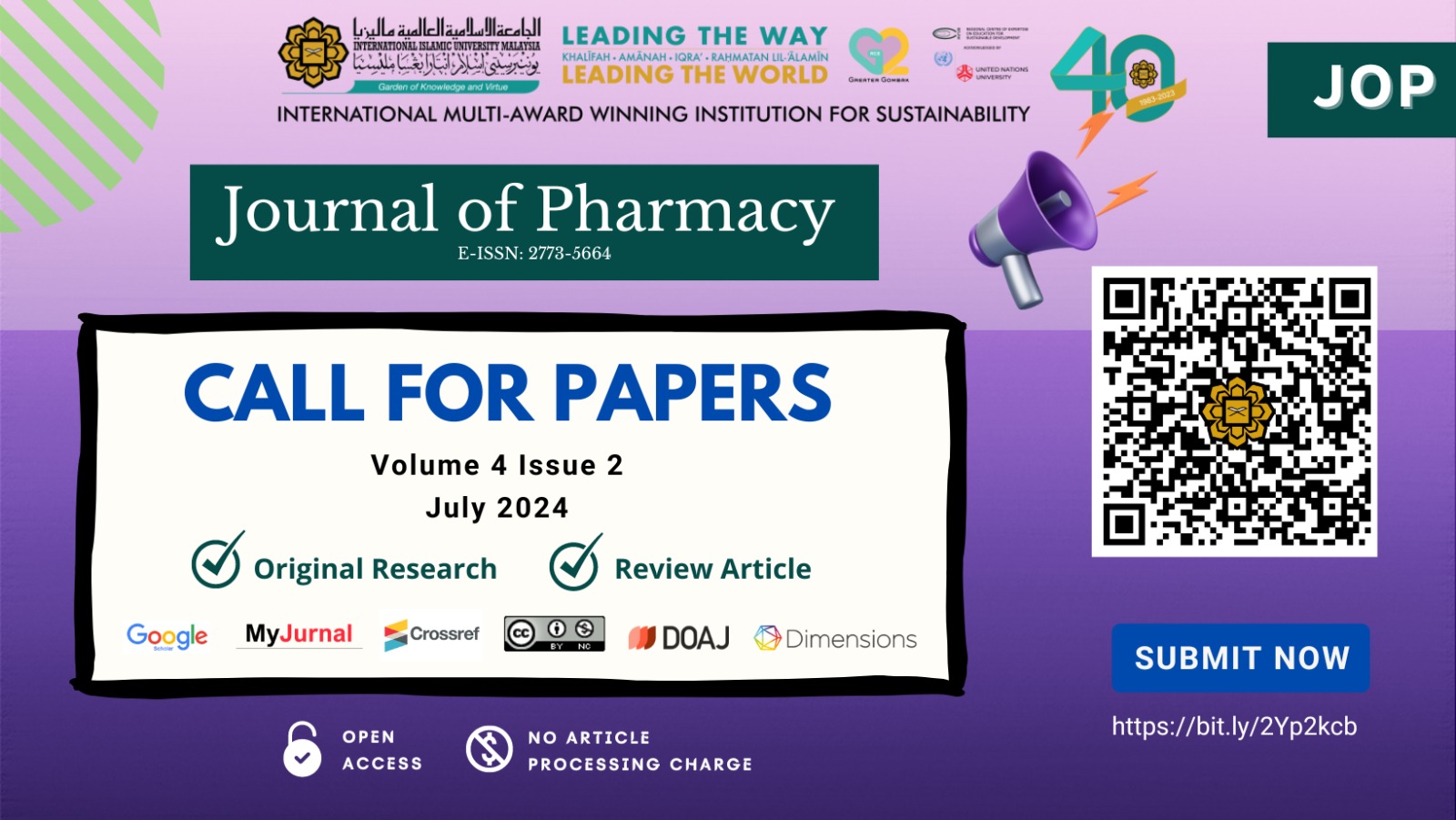Knowledge, Attitude, and Practice Towards Antibiotic Use Among the Public in the City of Kuantan, Pahang State, Malaysia.
DOI:
https://doi.org/10.31436/jop.v2i2.157Keywords:
Antibiotics use, public, knowledge, attitude, practice, MalaysiaAbstract
Background: Public knowledge and attitudes towards antibiotic use play a vital role in the success of controlling antibiotic resistance. This study aimed to assess the public’s knowledge, attitudes, and practice (KAP) towards antibiotic use in Kuantan, Malaysia.
Methods: This cross-sectional study was conducted among the general public above 18 years old. The data was collected in public places using a pre-validated questionnaire. Software Statistical Package for Social Sciences (SPSS) was used for statistical analyses.
Results: Out of 410 participants who answered the questionnaire, 229 (55.9%) of them were female and 288 (70.3%) had a college/university degree. It was found that 258 participants (62.9%) have good knowledge and 306 of them (74.6%) have positive attitude towards antibiotic use. However, 160 respondents (39%) believe that antibiotics can kill viruses and 183 respondents (44.6%) stated that they would ask the doctor to give them antibiotics in case they have common cold symptoms. Having a good knowledge was significantly related to the age (P=0.005), employment status (P<0.001), education level (P<0.001), and the field of work or study (P<0.001). Furthermore, 313 of the sample (76.3%) had an overall good practice. However, 162 participants (39.5%) do not complete their antibiotic course. Additionally, 57 participants (13.9%) share and 69 of them (16.8%) use the leftover antibiotics. Showing a good practice correlated to the field of work/study (P =0.04), level of knowledge (Spearman's rho = 0.373; P<0.001) and attitude (Spearman's rho = 0.55; P<0.001).
Conclusion: Although the majority of the public showed good KAP, there are still important gaps that need to be filled. Therefore, a public educational campaign is needed to improve the knowledge, attitude and practice towards antibiotic use.
References
Ab Rahman, N., Teng, C. L., & Sivasampu, S. (2016). Antibiotic prescribing in public and private practice: A cross-sectional study in primary care clinics in Malaysia. BMC Infectious Diseases, 16(1), 1–8. https://doi.org/10.1186/s12879-016-1530-2
C O Omolase, O E Adeleke, & O Afolabi. (2007). Self Medication Amongst General Outpatients in a Nigerian Community Hospital. Annal of Ibadan Postgraduate Medicine, 5, 64–67.
Center for Disease Control and Prevention. (2017). Antibiotic Use in the United States, 2017: Progress and Opportunities. US Department of Health and Human Services, 1–40. https://www.cdc.gov/antibiotic-use/stewardship-report/pdf/stewardship-report.pdf
Chen, C., Chen, Y. M., Hwang, K. L., Lin, S. J., Yang, C. C., Tsay, R. W., Liu, C. E., & Young, T. G. (2005). Behavior, attitudes and knowledge about antibiotic usage among residents of Changhua, Taiwan. Journal of Microbiology, Immunology and Infection, 38(1), 53–59.
Choo, S. J., Chang, C. T., Lee, J. C. Y., Munisamy, V., Tan, C. K., Raj, J. D., Taib, R. I. M., Thong, K. S., & Shafie, A. A. (2018). A cross-sectional study on public belief, knowledge and practice towards antibiotic use in the state of perak, malaysia. Journal of Infection in Developing Countries, 12(11), 960–969. https://doi.org/10.3855/jidc.10723
Chow, C. Q., & Nor Liana, C. Y. (2020). Knowledge and attitude on antibiotic use among public in rural area Batu Pahat, Johor. Malaysian Journal of Public Health Medicine, 20(1), 220–228. https://doi.org/10.37268/mjphm/vol.20/no.1/art.566
Ekambi, G. A. E., Ebongue, C. O., Penda, C., Nga, E. N., Mpondo, E. M., & Moukokoid, C. E. E. (2019). Knowledge, practices and attitudes on antibiotics use in Cameroon: Self-medication and prescription survey among children, adolescents and adults in private pharmacies. PLoS ONE, 14(2), e0212875. https://doi.org/10.1371/journal.pone.0212875
Islahudin, F., Tamezi, A. M. A., & Mohamed Shah, N. (2014). Knowledge, attitudes and practices about antibiotic use among the general public in Malaysia. Southeast Asian Journal of Tropical Medicine and Public Health, 45(6), 1474–1482.
Jifar, Al., & Ayele, Y. (2018). Assessment of Knowledge, Attitude, and Practice toward Antibiotic Use among Harar City and Its Surrounding Community, Eastern Ethiopia. Interdisciplinary Perspectives on Infectious Diseases, 2018. https://doi.org/10.1155/2018/8492740
Jose, J., Jimmy, B., Mohammed Saif AlSabahi, A. G., & Al Sabei, G. A. (2013). A study assessing public knowledge, belief and behavior of antibiotic use in an Omani population. Oman Medical Journal, 28(5), 324–330. https://doi.org/10.5001/omj.2013.95
Ka Keat, L., & Chew Charn, T. (2012). A cross sectional study of public knowledge and attitude towards antibiotics in Putrajaya, Malaysia. Southern Med Review, 5(2), 26–33. http://www.fmhs.auckland.ac.nz/sop/smr/issues.aspx%5Cnhttp://ovidsp.ovid.com/ovidweb.cgi?T=JS&PAGE=reference&D=emed11&NEWS=N&AN=2013125286
Langford, B. J., & Morris, A. M. (2017). Is it time to stop counselling patients to “finish the course of antibiotics”? Canadian Pharmacists Journal, 150(6), 349–350. https://doi.org/10.1177/1715163517735549
López Romo, A., & Quirós, R. (2019). Appropriate use of antibiotics: an unmet need. Therapeutic Advances in Urology, 11, 175628721983217. https://doi.org/10.1177/1756287219832174
Michael, C. A., Dominey-Howes, D., & Labbate, M. (2014). The antimicrobial resistance crisis: Causes, consequences, and management. In Frontiers in Public Health (Vol. 2, Issue SEP). Frontiers Media SA. https://doi.org/10.3389/fpubh.2014.00145
Michael, C. A., Dominey-Howes, D., Labbate, M., Maria, C., Elisabeth, J., Pitout, J., & Walsh, F. (2014). The antimicrobial resistance crisis: causes, consequences, and management. https://doi.org/10.3389/fpubh.2014.00145
Mouhieddine, T. H., Olleik, Z., Itani, M. M., Kawtharani, S., Nassar, H., Hassoun, R., Houmani, Z., Zein, Z. El, Fakih, R., Mortada, I. K., Mohsen, Y., Kanafani, Z., & Tamim, H. (2015). Assessing the Lebanese population for their knowledge, attitudes and practices of antibiotic usage. Journal of Infection and Public Health, 8(1), 20–31. https://doi.org/10.1016/j.jiph.2014.07.010
Oh, A. L., Hassali, M. A., Al-Haddad, M. S., Sulaiman, S. A. S., Shafie, A. A., & Awaisu, A. (2011). Public knowledge and attitudes towards antibiotic usage: A cross-sectional study among the general public in the state of Penang, Malaysia. Journal of Infection in Developing Countries, 5(5), 338–347. https://doi.org/10.3855/jidc.1502
Sartelli, M., Kluger, Y., Ansaloni, L., Carlet, J., Brink, A., Hardcastle, T. C., Khanna, A., Chicom-Mefire, A., Rodríguez-Baño, J., Nathwani, D., Mendelson, M., Watkins, R. R., Pulcini, C., Beovi?, B., May, A. K., Itani, K. M. F., Mazuski, J. E., Fry, D. E., Coccolini, F., … Catena, F. (2017). A Global Declaration on Appropriate Use of Antimicrobial Agents across the Surgical Pathway. Surgical Infections, 18(8), 846–853. https://doi.org/10.1089/sur.2017.219
Teixeira Rodrigues, A., Roque, F., Falcão, A., Figueiras, A., & Herdeiro, M. T. (2013). Understanding physician antibiotic prescribing behaviour: A systematic review of qualitative studies. International Journal of Antimicrobial Agents, 41(3), 203–212. https://doi.org/10.1016/j.ijantimicag.2012.09.003
Vanden Eng, J., Marcus, R., Hadler, J. L., Imhoff, B., Vugia, D. J., Cieslak, P. R., Zell, E., Deneen, V., McCombs, K. G., Zansky, S. M., Hawkins, M. A., & Besser, R. E. (2003). Consumer attitudes and use of antibiotics. Emerging Infectious Diseases, 9(9), 1128–1135. https://doi.org/10.3201/eid0909.020591
Ventola, C. L. (2015). The Antibiotic Resistance Crisis: Part 1: Causes and Threats. Pharmacy and Therapeutics, 40(4), 277. /pmc/articles/PMC4378521/
WHO Media centre. (2016). Media centre WHO multi-country survey reveals widespread public misunderstanding about antibiotic resistance. 1–7. https://www.who.int/news/item/16-11-2015-who-multi-country-survey-reveals-widespread-public-misunderstanding-about-antibiotic-resistance
You, J. H. S., Yau, B., Choi, K. C., Chau, C. T. S., Huang, Q. R., & Lee, S. S. (2008). Public knowledge, attitudes and behavior on antibiotic use: A telephone survey in Hong Kong. Infection, 36(2), 153–157. https://doi.org/10.1007/s15010-007-7214-5
Zahreddine, L., Hallit, S., Shakaroun, S., Al-Hajje, A., Awada, S., & Lahoud, N. (2018). Knowledge of pharmacists and parents towards antibiotic use in pediatrics: A cross-sectional study in lebanon. Pharmacy Practice, 16(3). https://doi.org/10.18549/PharmPract.2018.03.1194
Downloads
Published
How to Cite
Issue
Section
License
Copyright (c) 2022 IIUM Press

This work is licensed under a Creative Commons Attribution 4.0 International License.
Journal of Pharmacy at https://journals.iium.edu.my/ktn/index.php/jp is licensed under a Creative Commons Attribution 4.0 International License.












